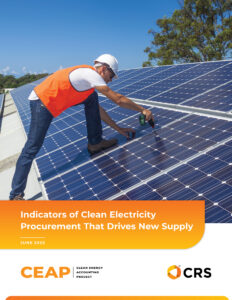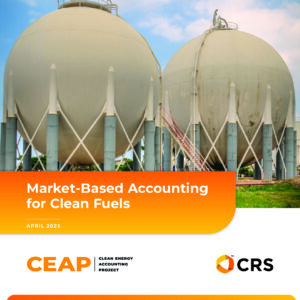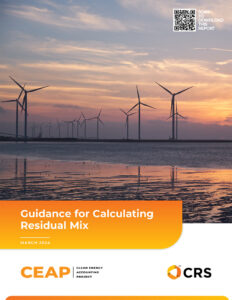Clean Energy Accounting Project
The Clean Energy Accounting Project (CEAP) develops standardized, stakeholder-reviewed clean energy and greenhouse gas (GHG) emissions accounting guidance addressing outstanding questions in voluntary and regulatory markets. Launched in 2020 by the Center for Resource Solutions (CRS), CEAP resolves areas of uncertainty in the measurement, tracking, and reporting of clean energy and GHG emissions by:
- Developing and promoting clean energy and GHG emissions accounting guidance and best practices
- Resolving specific, complex clean energy and GHG emissions accounting questions
- Facilitating interdisciplinary collaboration among key stakeholders
- Creating educational resources and participating in thought leadership events
- Fostering consensus among NGOs, policymakers, and corporate leaders to establish best practices for accounting methodologies, procurement strategies, and impact reporting
Key focus area for CEAP include:
Supplier Clean Electricity Procurement
Residual Mix Calculations
Impactful Clean Energy Procurement
Granular Matching and Accounting
Storage and Dispatchable Renewables
Clean Fuels
Standard Delivery Renewable Energy
Indicators of Clean Electricity Procurement that Drive Supply
Author: CRS Staff
Published: June 4th, 2025| Report | 19 Pages
Voluntary clean electricity procurement plays a critical role in accelerating the energy transition—but a lack of consensus on what kind of individual purchases directly drive or have an increased indirect impact on new clean energy and maintaining existing clean energy has led to market fragmentation and uncertainty for buyers and investors. This CEAP initiative produced new guidance…
Market-Based Accounting for Clean Fuels
Author: CRS Staff
Published: April 21st, 2025| Report | 31 Pages
Fuel producers and their customers concerned with managing the greenhouse gas (GHG) emissions from using fuels are pursuing ways to replace conventional fossil fuels with biologically derived and lower-emitting alternative fuels. To help spur investment in the production of these nascent fuels, these stakeholders are using markets for contractual instruments like certificates representing the environmental attributes of clean fuels…
Guidance for Calculating Residual Mix
Author: CRS Staff
Published: March 6th, 2024| Document | 31 Pages
Residual mixes are the attributes of unallocated or unclaimed energy delivered to customers on the electricity grid and are a critical tool that prevents the double counting of clean energy and supports accurate calculations of greenhouse gas emissions resulting from electricity use. To date, there has been no consensus on what data is needed and …
Founding Partners
Apple, Entergy, and Meta became CEAP Founding Partners with their extraordinary early commitments. Their advanced understanding of clean energy procurement in their respective industries will significantly advance CEAP’s goals. They guide priorities, strengthen standards-focused discussions, bolster the work of CRS staff, and collaborate with other Advisory Committee members to support CEAP’s activities.

The work of CEAP is fueled by Advisory Committee members, Initiative Sponsors, and Working Group participants, each contributing to ensure that CEAP’s work is both applicable and actionable across sectors, enabling swift and effective climate action.
Our Advisory Committee:
- 3Degrees
- Apple
- Carbon Solutions Group
- CDP
- Clean Energy Buyers Institute
- Constellation
- Meta
- Priority Power
- Steel Dynamics
- STX Group
Initiative Sponsors:
- Granular Energy (Hourly Utility Product Design Options)
- Retail Energy Advancement League (Power Source and Emissions Disclosure)
To learn more about how CEAP works and how you can get involved, visit the How CEAP Works page.
“The Clean Energy Accounting Project is addressing specific, complex questions in the clean energy and GHG emissions accounting space, providing clarity and guidance where it is needed. Energy customers will benefit from CEAP activities and resources, as the program facilitates information exchange among key stakeholders to form best practices and encourage consistency. CEBI is excited to collaborate on this consensus-driven work, which is essential to advancing participation in the voluntary market.”
—Priya Barua, Director for Market & Policy Innovation, Clean Energy Buyers Institute (CEBI)
“The increasing pace and scope of clean energy and greenhouse gas goals makes substantiating credible claims all the more important. CRS’s 25 years of leadership in renewable energy standard development and environmental innovation makes it exceptionally qualified to solve energy and greenhouse gas accounting questions that can complicate sustainable energy progress. The Clean Energy Accounting Project will be a crucial resource for organizations and government agencies working through the details of accounting for clean energy transactions and substantiating credible claims.”
—Holly Lahd, Energy Manager, Meta
STAY IN TOUCH
For more information about CEAP, sign up for our updates or email us at ceap@resource-solutions.org.


